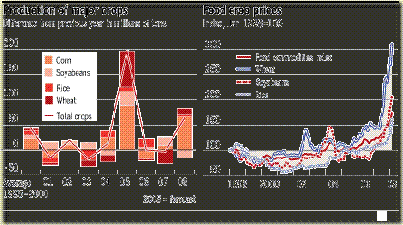Martin Wolf writes in Financial Times column:
Demand factors:
- Rising incomes per head in the emerging economies
- Changing pattern of food consumption (shift from food to meat reduces food supply as it is being used to rear animals)
- Subsidised biofuels production in the West raise demand for maize
- Aggregate maize, rice, and soybeans production stagnated in 2006 and 2007 (partly due to drought)
- Increasing speculation because of declining stock
Are prices going to remain high? Two opposing forces are at work. The first is the market, which will tend to bring prices back down as supplies expand and demand shrinks. But the latter is also what we want to avoid, at least in the case of the poor, since reducing their consumption is not so much a solution as a failure. The second force is the current intense pressure on the world’s food system. This is true of both demand and costs of supply. Prices are likely to remain relatively elevated, by historical standards, unless (or until) energy prices tumble.
What needs to be done?
- humanitarian factors
- trade and other policy interventions
- longer-term productivity and production
The present crisis is a golden opportunity to eliminate this plethora of damaging interventions. The political focus of the Doha round on lowering high levels of protection is largely irrelevant. The focus should, instead, be on shifting the farm sector towards the market, while cushioning the impact of high prices on the poor.
Finally, far greater resources need to be devoted to expanding long-run supply. Increased spending on research will be essential, especially into farming in dry-land conditions. The move towards genetically modified food in developing countries is as inevitable as that of the high-income countries towards nuclear power. At least as important will be more efficient use of water, via pricing and additional investment. People will oppose some of these policies. But mass starvation is not a tolerable option.
